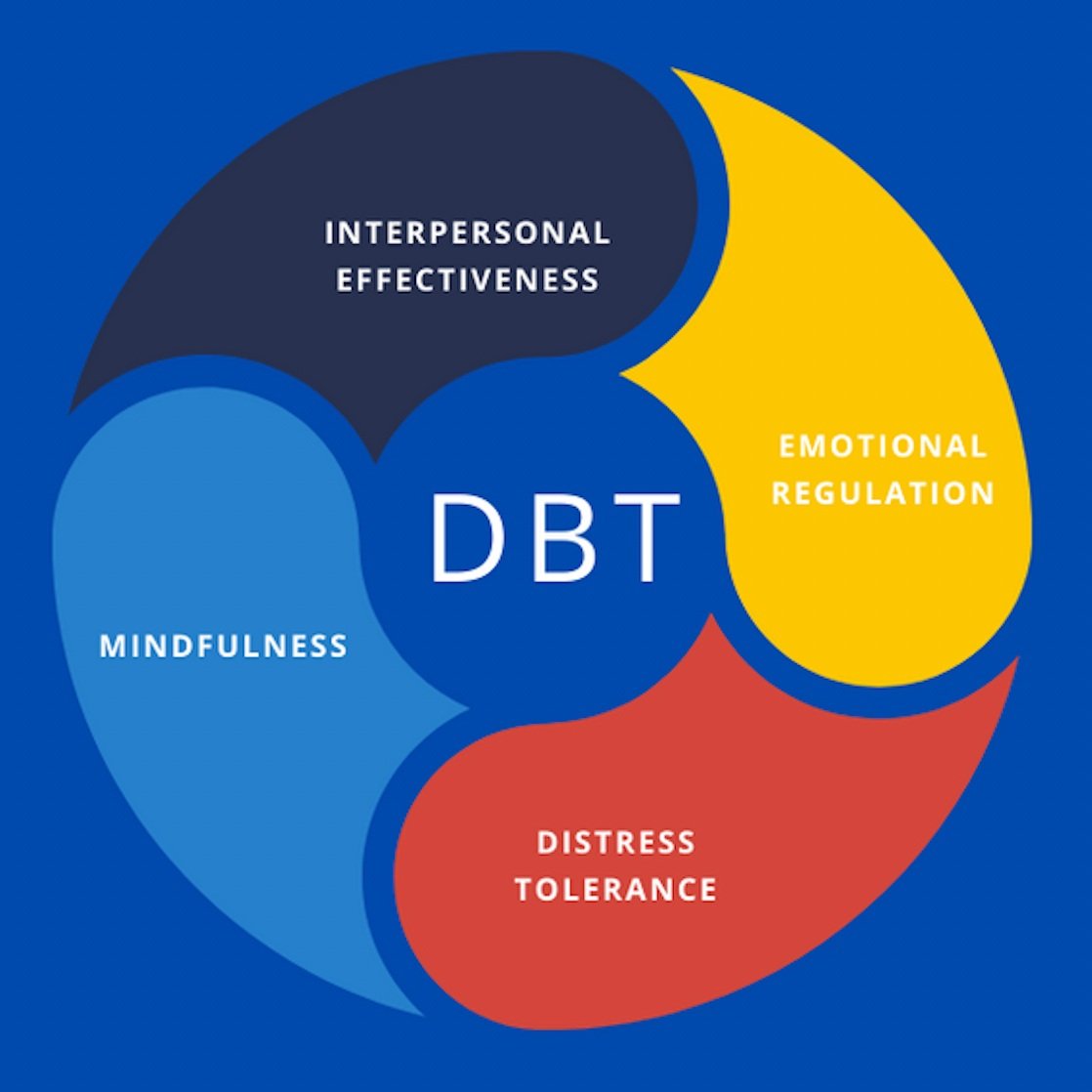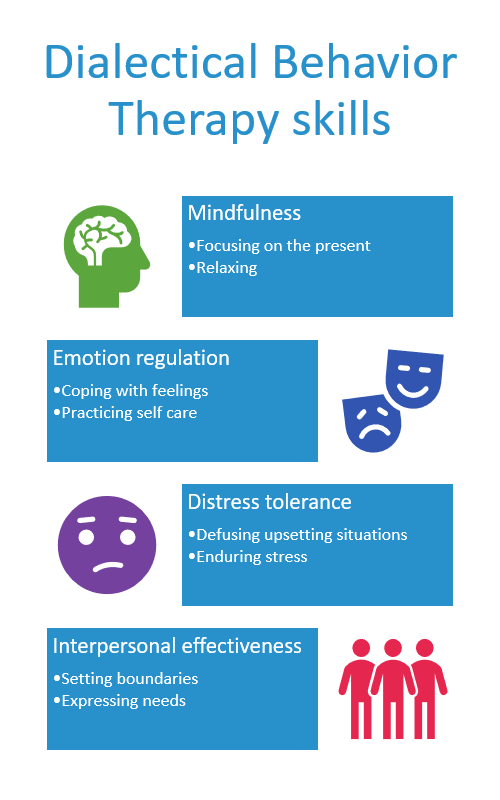Using the Power of Dialectical Behaviour Treatment (DBT) Providers for Sustainable Emotional Equilibrium and Improved Relationships
In a globe where psychological health and keeping healthy and balanced relationships are crucial parts of a fulfilling life, the use of Dialectical Practices Treatment (DBT) services has become a sign of expect several people. The evidence-based and structured approach of DBT uses a path in the direction of sustainable psychological equilibrium and improved interactions with others. By focusing in on core concepts, people can create necessary abilities for regulating feelings, enhancing interpersonal effectiveness, and cultivating mindfulness. The real power of DBT exists not simply in comprehending these principles however in the functional application of techniques in day-to-day life. As we navigate the complexities of human emotions and connections, harnessing the potential of DBT services ends up being a transformative trip worth exploring additionally.

Understanding the Core Principles of DBT
Dialectical Habits Therapy (DBT) is started upon a set of core concepts that underpin its healing strategy to promoting psychological equilibrium and mental health. Mindfulness is another core principle of DBT, focusing on being totally present in the minute without judgment.

Recognition is also indispensable to DBT, highlighting the value of accepting and acknowledging one's experiences and feelings as legitimate. Via validation, people can find out to navigate their sensations with compassion and understanding, fostering self-acceptance and psychological development. plays an essential role in DBT, highlighting the modification of maladaptive behaviors through support and skill-building. By integrating these core principles into therapy, DBT uses a comprehensive and reliable strategy to advertising psychological well-being and mental strength.
Establishing Psychological Policy Abilities
Emotional policy abilities are necessary parts of Dialectical Behavior Treatment (DBT) that enable individuals to effectively manage their emotions and browse difficult circumstances with durability. These skills include the capability to identify and recognize one's feelings, endure distress, regulate intense sensations, and act based on individual values even despite psychological chaos. Establishing emotional guideline skills entails learning mindfulness methods to stay present in the moment, comprehending the triggers that lead to emotional dysregulation, and carrying out coping methods to regulate psychological responses.
-p-800.png)
Enhancing Interpersonal Effectiveness
Improving interaction abilities and promoting significant links with others are important aspects of creating social efficiency within the framework of Dialectical Habits Therapy (DBT) In DBT, improving social efficiency includes finding out just how to assertively express one's needs and borders while also taking into consideration the needs and limits of others. This ability is important for lessening and building healthy connections conflict. DBT instructs people just how to connect effectively, navigate interpersonal difficulties, and develop approaches for resolving conflicts in a positive manner.
One trick component of boosting interpersonal effectiveness in DBT is finding out to recognize and take care of feelings in social interactions. DBT London. By enhancing emotional understanding, people can reply to others in a more empathetic and understanding way. In addition, DBT stresses the significance of practicing mindfulness in interpersonal relationships, encouraging people to be existing in their interactions and totally engage with others
Practicing Mindfulness Techniques
Developing a constant mindfulness technique is important for people undertaking Dialectical Behavior modification (DBT) to grow emotional policy and boost their social performance. Mindfulness methods, a core element of DBT, include paying interest to the present minute without judgment. Via mindfulness, individuals can become extra aware of their thoughts, emotions, and bodily sensations, her response allowing them to reply to circumstances with higher clearness and control.
One secret mindfulness strategy used in DBT is mindfulness reflection. This technique entails concentrating on the breath or a certain item while recognizing and allowing go of any kind of disruptive thoughts. By integrating mindfulness reflection right into their day-to-day regimen, people can educate their minds to stay existing and decrease reactivity to stress factors.
Another vital element of practicing mindfulness in DBT is the concept of extreme acceptance. Radical approval involves totally accepting fact as it is, even when it is excruciating or challenging. By accepting the existing moment without judgment, individuals can minimize their suffering and include favorable adjustment.
Using DBT Methods in Life
Building upon the structure of mindfulness techniques such as meditation and radical acceptance, individuals can integrate DBT methods right into their everyday lives to cultivate psychological balance and boost their interpersonal abilities. In addition, social efficiency skills showed in DBT can aid people communicate their needs assertively, established boundaries, and keep healthy connections. By constantly applying these DBT methods in everyday life, people can experience sustainable emotional equilibrium and boost their overall well-being.
Verdict

Emotional guideline abilities are vital parts of Dialectical Behavior Treatment (DBT) that enable individuals to effectively handle their emotions and navigate challenging scenarios with resilience.With DBT services, people can grow a deeper understanding of their feelings, acknowledge patterns of behavior that contribute to psychological distress, and get sensible devices to regulate their sensations constructively.Creating a constant mindfulness technique is important for people undergoing Dialectical Actions Therapy (DBT) to cultivate emotional guideline and enhance their interpersonal performance.Structure upon the foundation of mindfulness techniques such as meditation and radical approval, people can integrate DBT methods into their daily lives to cultivate psychological equilibrium and improve their interpersonal skills. By recognizing the core principles of DBT, establishing emotional guideline skills, boosting interpersonal performance, exercising mindfulness strategies, and using DBT methods in day-to-day life, people can experience considerable enhancements in their total health and connections.
Comments on “Empowerment Via DBT London: Building Strength, Finding Balance”